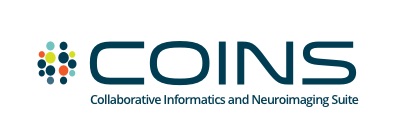

Neuroinformatics //

Built here at MRN, COINS (Collaborative Informatics and Neuroimaging Suite) is an end-to-end web based data management system. This tool suite provides an intuitive interface for easy data collection and management as well as rapid sharing among internal and external investigators. It offers tools to collect, manage and store participant demographics, clinical assessment and MRI, MEG, EEG data. Institutions across the country have also employed COINS for their data management platform including, Nathan Kline Institute, Child Mind Institute, University of Colorado – Boulder, Olin Neuropsychiatry Research Center and many more.
Visit coins.mrn.org for more information on our tools! If you are interested in a demo please click here to fill out the contact form.
Research //
Mining the Genomewide Scan
Genetic profiles of structural loss in schizophrenia: The development of both neuroimaging and genome-wide scanning technologies has created a proliferation of data about neuropsychiatric disorders. It is possible to collect more information in a study about each subject than there are subjects available to study, creating a challenge for standard statistical techniques. We develop an approach already used separately in imaging and genetics, but apply it here to the combination of imaging genetic data on a massive dataset, to determine genetic effects on brain structure in psychiatric disorders. Schizophrenia is a highly heritable neuropsychiatric disorder with significant public health costs. Understanding the contributions of genetic variability in the disease will help identify better predictors of prognosis and treatment response. Current studies are using genome wide scan (GWS) approaches to identify the numerous genes which might play a role in schizophrenia-either in increased risk for the disorder overall, or through modulating the various clinical symptoms. Structural neuroimaging measures implicate gray matter loss in schizophrenia; subjects with schizophrenia tend to have larger ventricles and smaller grey matter volumes than do their healthy counterparts, and regional loss in the medial frontal, temporal and insular gyri have been identified by us and others. Identifying the genetic influences underlying these patterns of gray matter loss is the goal of this project.
Cognitive Paradigm Ontology
Cognitive Paradigm Ontology (CogPO), a domain ontology of cognitive paradigms, facilitates descriptions of cognitive experimental paradigms in ways that are machine-readable and machine-interpretable, to allow communication and automated data sharing across diverse databases and data sources. The design of CogPO concentrates on what can be observed directly: categorization of each paradigm in terms of (1) the stimulus presented to the subjects, (2) the requested instructions, and (3) the returned response. All paradigms are essentially comprised of these three orthogonal components, and formalizing an ontology around them is a clear and direct approach to describing paradigms. This structured, well-defined, common and controlled vocabulary will be capable of representing the cognitive paradigms across a variety of data repositories. This ontology will be made available for adoption not only by other fMRI databases, but also for archives of other neuroimaging modalities (e.g., EEG or MEG data), such as the Neural ElectroMagnetic Ontologies (NEMO), and literature neuroinformatics efforts such as the Society for Neuroscience's PubMed Plus.

